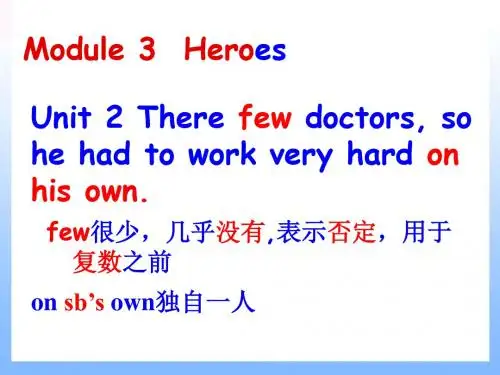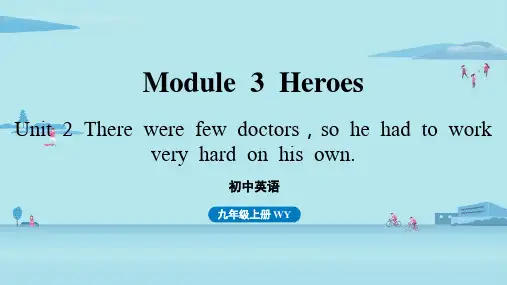外研版九年级英语上册 My hero -- Dr Norman Bethune 思维导图
- 格式:xmin
- 大小:46.88 KB
- 文档页数:1
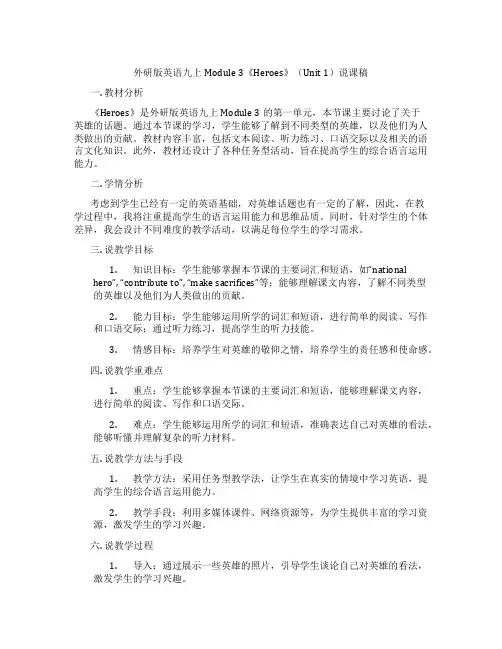
外研版英语九上Module 3《Heroes》(Unit 1)说课稿一. 教材分析《Heroes》是外研版英语九上Module 3的第一单元,本节课主要讨论了关于英雄的话题。
通过本节课的学习,学生能够了解到不同类型的英雄,以及他们为人类做出的贡献。
教材内容丰富,包括文本阅读、听力练习、口语交际以及相关的语言文化知识。
此外,教材还设计了各种任务型活动,旨在提高学生的综合语言运用能力。
二. 学情分析考虑到学生已经有一定的英语基础,对英雄话题也有一定的了解,因此,在教学过程中,我将注重提高学生的语言运用能力和思维品质。
同时,针对学生的个体差异,我会设计不同难度的教学活动,以满足每位学生的学习需求。
三. 说教学目标1.知识目标:学生能够掌握本节课的主要词汇和短语,如“nationalhero”, “contribute to”, “make sacrifices”等;能够理解课文内容,了解不同类型的英雄以及他们为人类做出的贡献。
2.能力目标:学生能够运用所学的词汇和短语,进行简单的阅读、写作和口语交际;通过听力练习,提高学生的听力技能。
3.情感目标:培养学生对英雄的敬仰之情,培养学生的责任感和使命感。
四. 说教学重难点1.重点:学生能够掌握本节课的主要词汇和短语,能够理解课文内容,进行简单的阅读、写作和口语交际。
2.难点:学生能够运用所学的词汇和短语,准确表达自己对英雄的看法,能够听懂并理解复杂的听力材料。
五. 说教学方法与手段1.教学方法:采用任务型教学法,让学生在真实的情境中学习英语,提高学生的综合语言运用能力。
2.教学手段:利用多媒体课件、网络资源等,为学生提供丰富的学习资源,激发学生的学习兴趣。
六. 说教学过程1.导入:通过展示一些英雄的照片,引导学生谈论自己对英雄的看法,激发学生的学习兴趣。
2.呈现:介绍本节课的主要词汇和短语,让学生通过阅读课文,了解不同类型的英雄以及他们为人类做出的贡献。
3.操练:通过听力练习,提高学生的听力技能;通过口语交际,让学生运用所学的词汇和短语,表达自己对英雄的看法。
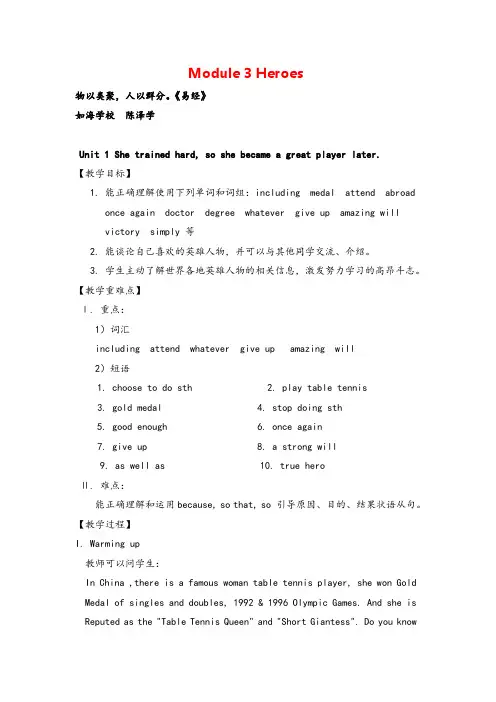
Module 3 Heroes物以类聚,人以群分。
《易经》如海学校陈泽学Unit 1 She trained hard, so she became a great player later.【教学目标】1. 能正确理解使用下列单词和词组:including medal attend abroadonce again doctor degree whatever give up amazing willvictory simply 等2. 能谈论自己喜欢的英雄人物,并可以与其他同学交流、介绍。
3. 学生主动了解世界各地英雄人物的相关信息,激发努力学习的高昂斗志。
【教学重难点】Ⅰ. 重点:1)词汇including attend whatever give up amazing will2)短语1. choose to do sth2. play table tennis3. gold medal4. stop doing sth5. good enough6. once again7. give up 8. a strong will9. as well as 10. true heroⅡ. 难点:能正确理解和运用because, so that, so 引导原因、目的、结果状语从句。
【教学过程】I. Warming up教师可以问学生:In China ,there is a famous woman table tennis player, she won Gold Medal of singles and doubles, 1992 & 1996 Olympic Games. And she is Reputed as the "Table Tennis Queen" and "Short Giantess". Do you knowwho she is and why she is famous?Give sme pictures about Deng Yaping.II. PresentationGive some pictures about new words, then let students remember them as quickly as possible.III. ListeningFinish Activity 2 on page 18.Listen and choose the correct answer.IV. Reading1. Listen ad answer the questions.1) Who is Daming’s hero?2) When did she start playing table tennis?3) How many gold medals has she won in the Olympics?2. Finish Activity 3 on page 19.Read and compete the table.3. Read the conversation again and finish Activity 4 on page 19. (学生独立完成后,小组内交流答案。
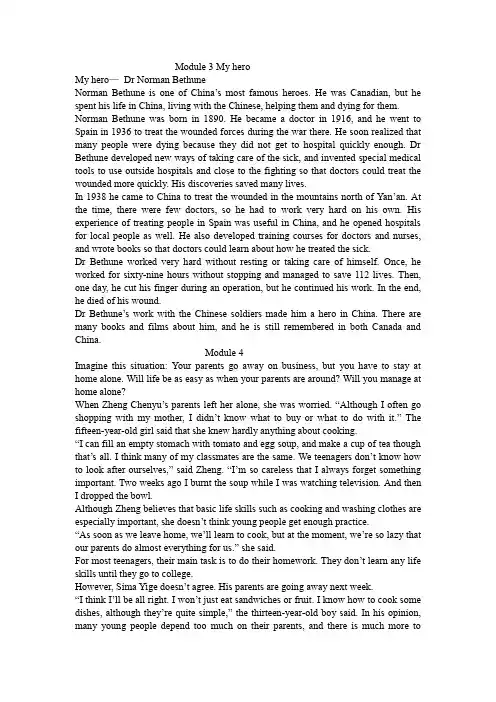
Module 3 My heroMy hero—Dr Norman BethuneNorman Bethune is one of China’s most famous heroes. He was Canadian, but he spent his life in China, living with the Chinese, helping them and dying for them. Norman Bethune was born in 1890. He became a doctor in 1916, and he went to Spain in 1936 to treat the wounded forces during the war there. He soon realized that many people were dying because they did not get to hospital quickly enough. Dr Bethune developed new ways of taking care of the sick, and invented special medical tools to use outside hospitals and close to the fighting so that doctors could treat the wounded more quickly. His discoveries saved many lives.In 1938 he came to China to treat the wounded in the mountains north of Yan’an. At the time, there were few doctors, so he had to work very hard on his own. His experience of treating people in Spain was useful in China, and he opened hospitals for local people as well. He also developed training courses for doctors and nurses, and wrote books so that doctors could learn about how he treated the sick.Dr Bethune worked very hard without resting or taking care of himself. Once, he worked for sixty-nine hours without stopping and managed to save 112 lives. Then, one day, he cut his finger during an operation, but he continued his work. In the end, he died of his wound.Dr Bethune’s work with the Chinese soldiers made him a hero in China. There are many books and films about him, and he is still remembered in both Canada and China.Module 4Imagine this situation: Your parents go away on business, but you have to stay at home alone. Will life be as easy as when your parents are around? Will you manage at home alone?When Zheng Chenyu’s parents left her alone, she was worried. “Although I often go shopping with my mother, I didn’t know what to buy or what to do with it.”The fifteen-year-old girl said that she knew hardly anything about cooking.“I can fill an empty stomach with tomato and egg soup, and make a cup of tea though that’s all. I think many of my classmates are the same. We teenagers don’t know how to look after ourselves,” said Zheng. “I’m so careless that I always forget something important. Two weeks ago I burnt the soup while I was watching television. And then I dropped the bowl.Although Zheng believes that basic life skills such as cooking and washing clothes are especially important, she doesn’t think young people get enough practice.“As soon as we leave home, we’ll learn to cook, but at the moment, we’re so lazy that our parents do almost everything for us.” she said.For most teenagers, their main task is to do their homework. They don’t learn any life skills until they go to college.However, Sima Yige doesn’t agree. His parents are going away next week.“I think I’ll be all right. I won’t just eat sandwiches or fruit. I know how to cook some dishes, although they’re quite simple,” the thirteen-year-old boy said. In his opinion, many young people depend too much on their parents, and there is much more tolearn than cooking, like tidying up your room or even getting dressed”.For most school children, it’s no holiday when their parents are away. It’s more like real life in the future!Module 5Welcome to the most friendly museum in London. In most museums, there’s no shouting and no running, and you mustn’t touch anything. But the Science Museum is different… it’s noisy! People talk about what they can see and do here, and there are some very noisy machines as well. If you want answers to all your questions about science, this is the right place for you.On the ground floor is the Launchpad. This is my favourite room because there are lots of physics experiments. For example, if you want to fill a bag with sand, you have to control a kind of truck on wheels and move it into the correct place. You can also find out how we travel into space and back again.Upstairs is the Human and Nature Room. There you can compare the speed of different animals with your own. When you hear a noise you push a key. If you aren’t fast enough, the lion catches you! I’m faster than all my friends, but the lion still catches me.I also like to visit the other rooms on the second and third floors. You can learn about communication, environment as well as maths, physics and chemistry. For example, you can find out how X-ray let you see inside your body. And in one room they even explain how they dig coal from the ground and use it to create energy.The Science Museum is interesting for people of all ages, as long as you follow the rules. You cannot take photos, but if you want postcards, you can buy them in the shop. The museum is free to enter, so you go in for a few minutes or stay all day. It’s open every day from 10 am to 6 pm. So if you ever go to London, make sure you visit the Science Museum. It’s my favourite museum in the whole world.Module 6Dear Diana,Last week, my friend David came round with a new computer game and asked to play it on my father’s computer. I was worried, because I should ask my father before I use his computer. He uses it for his work and I can only use it for my homework. The reason is that he thinks it’ll go wrong if I play games on it.Well, while my dad was out, we decided to try out David’s game. We copied it to the computer, and at the end of the game, we took it off. However, when I started the computer again to check if everything was OK, some of my dad’s records were missing.Then, when my dad used the computer last night, he was really angry. He could no longer find the records anywhere! They were very important ones.I didn’t tell him about the computer game because I didn’t want him to be angry with me. Should I tell him about the computer game? Should I play to repair it?Yours,SteveDear Steve,Oh dear! You’ve made two mistakes. It’s bad enough that you used your dad’s computer when he told you no to. You should never do that. But it’s even worse that you didn’t tell him about it. If you tell him the truth now, he’ll be angry with you, but at least you’ll show how honest you are.Then you should pay the bill to repair it. But you shouldn’t use your pocket money—after all, your parents gave you that money. If you offer to do some jobs around the home, he’ll realise that you’re very sorry.Oh, and next time, play football with David!Best wishes,DianaModule 7My favourite great book is The Adventures of Tom Sawyer by Mark Twain. Tom lives with his aunt Polly in St Petersburg, Missouri, the US, and is a lively and clever boy. Tom is the hero of the story, but there are other important people in the book. His good friend Huck Finn lives outside the community, and everyone is afraid of him. Joe is another friend of Tom’s. Becky is a lovely girl with fair hair, and Injun Joe is the bad man of the story.Tom has many adventures. In one part of the book, he runs away with his two friends, Huck Finn and Joe, to an island in the middle of the Mississippi River for several days. Another time, Tom goes with Huck to look for treasure. With Becky he gets lost in a dark place, and finally, they find a box full of money.My favourite part in the book is when everyone thinks Tom and Huck are dead. They decide to go to the church, and see their family and neighbours. They have come to remember them. Tom hides and watches for a time, and then suddenly he appears. At first everyone is surprised to see him, but then they’re just pleased to see him alive. The story is about growing up. It describes how strangers are seen in small towns of America. Finally, it talks about what it’s like to be free, law and order in society, and how bad people pay for their actions.Why do I think Tom Sawyer is a great book? It’s as American as apple pie, and although Mark Twain wrote it in 1876, it’s still read and loved by people all over the world today. It’s written in the everyday English of the southern states of America in the nineteenth century, and the dialogues sound especially real. Today it’s thought to be one of the greatest American stories. Go on—read it! I know you’ll enjoy it too. Module 8For Liu Xiang, life as a sports hero began in 2004. First, he was invited to competitions around the world. Then he was chosen for the Chinese team at the Olympic Games.But Liu Xiang was not a success immediately. He was born in Shanghai on 13th July, 1983 started training when he was very young. In Grade Four, he went to the Junior Sports School of Putuo District of Junior. Liu was encouraged at first to train for the high jump.Then, in 1998, Liu Xiang’s ability in hurdling (running and jumping)was noticed by his coach Sun Haiping. A special programme was set up in 2001 to help young sportsmen and sportswomen. Liu Xiang’s races were recorded, and he was compared with the world’s best sports stars. Sun Haipingused the information to change his training methods for Liu Xiang.In 2002 Liu Xiang won his first international 110 hurdles race in Switzerland, and in the same year, a gold at the Asia Games. Then, in 2004, Liu won the first Olympic gold for China and in the same time as the world record. It was also the first time an Olympic gold for running or hurdling was hung round the neck of a sportsperson from any Asian country. Later Liu Xiang went on to win competitions in Europe and the Middle East.Liu Xiang trained very hard. In fact he trained so hard that he hurt his foot. From 2008 on he suffered a lot from his foot problem and was often absent from competitions.Although no one is sure about his future in sport, Liu Xiang is a symbol of courage and success, and we continue to have great pride in him.Module 91 Every morning my father buys a newspaper on his way to work. Every day I open my books in class and start my lessons. Every evening my mother looks through magazines at home. And every night I look at the photos of David Beckham and Yao Ming on my bedroom wall before I go to sleep. Can we imagine life without paper or print?2Paper was first created about 2,000 years ago in China and was made of silk, bamboo, grass and later, wood. People learnt to write words on paper to make a book. But in those days, books were only produced one at a time by hand. As a result, there weren’t many books, and they were expensive. So, few people learnt to read.3Then printing was invented in China. The first printed books were made by placing wood blocks against paper. An important development in printing in the Western world took place in the fifteenth century. They found a way to produce books more quickly and cheaply. As a result, a trade in books developed, and more people learnt to read. Knowledge and ideas spread quickly, and we can compare this change to the introduction of the Internet in the twentieth century.4 But will books be needed in the future? Today information is found online more easily than in books and is kept on CD-ROMs or machines such as MP3 players. These machines are smaller and lighter than books so that they are very easy to carry.5 computers are already used in classrooms, and newspapers and magazines are already read online. So what direction will traditional printing take in the future? Will computers be used more than printed books and photos in the future? No, I can only afford a Yao Ming photo on my bedroom wall, not a computer screen two metres high!Module 10Dear Mum and Dad,I’m writing this letter to you from the centre of Australia. At the moment we’re staying near Uluru. On the first day, we took a plane tour over the rock, and I was surprised at how big it was: 3.6 kilometres long and 348 metres high. During different periods of the day, the colours of the rock turn dark blue, purple, yellow and red. The Aborigines are the people that have lived in Australia from the earliest times, and their ancient stories describe the spirits that created the world. Uluru is a centre of Aboriginal culture.The Australians have a close relationship with the British. They have many British relatives and they’re like us in many ways. The food that Australians like most are ham and beef with lots of salad. They also grow grapes and other fruit. They love all sports, but the game that they like most is Australian football. Because most Australians live near the coast, they love going to the beach for swimming and surfing.Although it’s December, it’s summer over there. The sun is very bright, and near the coast the countryside is very green. There are lots of sheep in the fields and on the hills, but the middle of the country has no trees or grass, just rocks and sand… And kangaroos!Most Australians speak English, although they say “Gooday!”and “No worries.”They mean “Hello” and “Don’t worry about it. It’s not a problem!”The next day after we arrived in Uluru, we went up on a horse ride. The horse that I rode was sleepy. It just lay on the ground most of the time…Finally, later this evening, we’re taking the plane back to Sydney and coming home. It’s been a wonderful trip.Love,TonyModule 11We were very happy with our photo competition this year. Compared with other years, we received many more photos. Even though all of the photos are excellent, we can’t give prizes to everyone. There are four prizes, so read on to find out who the winners are…The person who won the prize for the subject Nature is fifteen-year-old Li Wei. Li Wei took a photo of the tallest hill in Xiangshan Park. His photo shows the different colours on the hill.The photo which we liked best in the City and People group was taken by Zhao Min. Zhao Ming is only twelve years old. Her photo is of a single person rushing across a street somewhere in northern China on a grey wearing blouse and skirt, who is holding her books over her head to protect herself against the showers.The best photo in the Music group was taken by He Zhong. His photo of the group Crazy Feet shows the singer, Beck Wang and the band playing at a concert in Shenzhen. He Zhong manages to show how this great new band moves and sounds, and the good time which their fans are having.A number of photos which Beijing and Cambridge in England have won the prize for the subject Home and Away. They show some of the experiences of a young visitor to our country, and some memories of his home. The winner is Tony Smith. Congratulations to our winners and thanks to everyone who entered the competition. Tonight we’re all having dinner together, and on the menu is traditional Beijing duck. We are very lucky that famous John Williams is in China to talk about his new book of photos, and will present the prizes to the winners.Module 12How to be greenBy Wang LingingHow green are you? Try these questions and see.●Do you walk or ride a bike to school?●Do you buy new clothes just because they are modern?●Do you buy things produced locally and not made abroad?●Do you take your own bag when shopping and not ask for a plastic bag?●Do you buy drinks in bottles? And what do you do with the bottles when they’reempty?●Do you divide the waste into things to recycle and things to throw away?We all need a healthy environment, but we produce waste every day and it’s harmful to our environment. Repeat these three words every day: Reduce, reuse and recycle. ReduceReduce means “use less”. Don’t waste things. It saves money, causes less pollution , and less waste goes into the environment. Before we buy something new, think whether it is really necessary, because maybe the used one is just as good! When we do buy things, choose local products, and try not to buy too many things from abroad. ReuseReuse means “use again”. Use things for as long as possible. Look after them so that they will last. Repair them if possible. Don’t throw away and buy new ones. Don’t use us a paper cup or a paper bag. It’s better to use a china cup and a lunchbox because you can use them again.RecycleRecycle means “change things into something else to be reused”. Although it takes energy to change something into something else, it’s better than throwing things away or burning them. We throw tons of rubbish away each year, and we have to stop. Divide your rubbish into plastic, glass, paper and rubber. Develop a recycling policy for the whole community. Buy products such as recycled paper to help save trees.We cannot hope for raid change, but let’s take these simple steps today so that we’ll save the world for our grandsons and granddaughters tomorrow.。
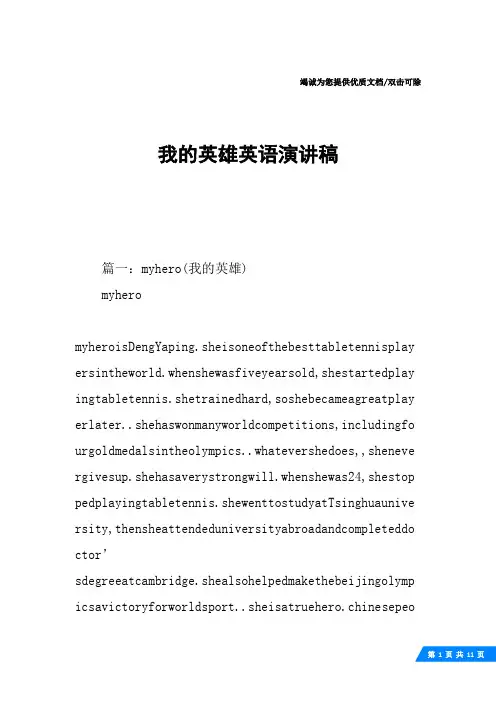
竭诚为您提供优质文档/双击可除我的英雄英语演讲稿篇一:myhero(我的英雄)myheromyheroisDengYaping.sheisoneofthebesttabletennisplay ersintheworld.whenshewasfiveyearsold,shestartedplay ingtabletennis.shetrainedhard,soshebecameagreatplay erlater..shehaswonmanyworldcompetitions,includingfo urgoldmedalsintheolympics..whatevershedoes,,sheneve rgivesup.shehasaverystrongwill.whenshewas24,shestop pedplayingtabletennis.shewenttostudyatTsinghuaunive rsity,thensheattendeduniversityabroadandcompleteddo ctor’sdegreeatcambridge.shealsohelpedmakethebeijingolymp icsavictoryforworldsport..sheisatruehero.chinesepeopleareproudofher..Ilikeherbest.篇二:英语演讲?Ifyoutravelfromtheoutsidetojinanalongawideandc leanroad,youwillarriveatabeautifulplacewhichonlycanappearinyourdream,butnow, Iwilltellyouthatyouarenotdreaming.Thisbeautifulplac enamed“licheng─myhometown,itstandsneartheYellowRiveratthefootofQue mountain,Itisasmallcitycoveredbygreenandit’sfamousforthebeautifulscenery,excellentclimateandlo nghistory.Inthepast,itwaspoor.peoplewhooncecameheredidnotwant tocomeagain,why?Thestreetswerefullofrubbishesandthebuildingswer eoldandsmall,whentherewerestrongwindsthebuildingswereshakingasif theywantedtosay“hello”toyou.buttoday,withtheleadofourgovernment,manychangeshavetakenplac e,lifeismuchbetterthanbefore。
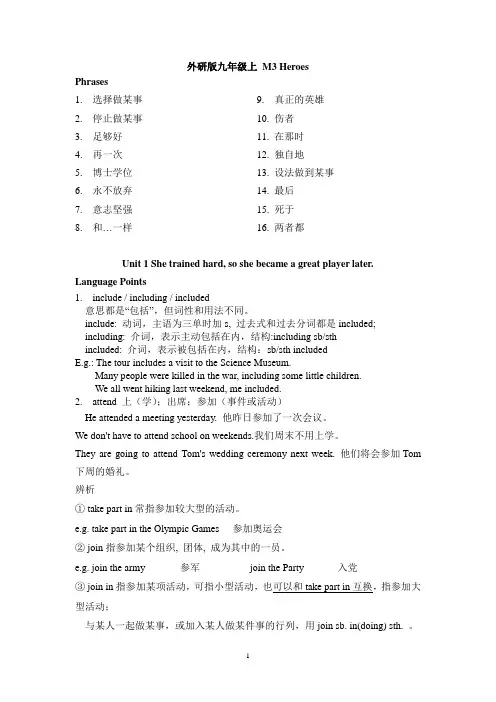
外研版九年级上M3 Heroes Phrases1.选择做某事___________________2.停止做某事___________________3.足够好_______________________4.再一次_______________________5.博士学位_____________________6.永不放弃_____________________7.意志坚强_____________________8.和…一样_____________________ 9.真正的英雄___________________10.伤者_________________________11.在那时_______________________12.独自地_______________________13.设法做到某事_________________14.最后_________________________15.死于_________________________16.两者都_______________________Unit 1 She trained hard, so she became a great player later. Language Points1.include / including / included意思都是“包括”,但词性和用法不同。
include: 动词,主语为三单时加s, 过去式和过去分词都是included; including: 介词,表示主动包括在内,结构:including sb/sthincluded: 介词,表示被包括在内,结构:sb/sth includedE.g.: The tour includes a visit to the Science Museum.Many people were killed in the war, including some little children.We all went hiking last weekend, me included.2.attend 上(学);出席;参加(事件或活动)He attended a meeting yesterday. 他昨日参加了一次会议。
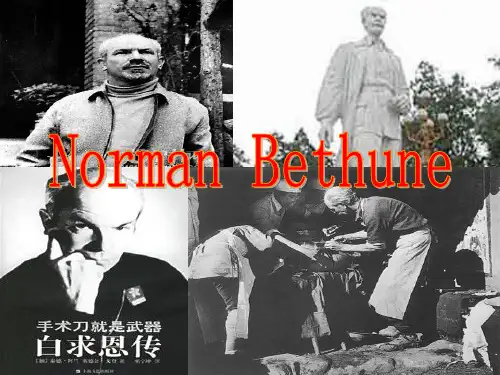
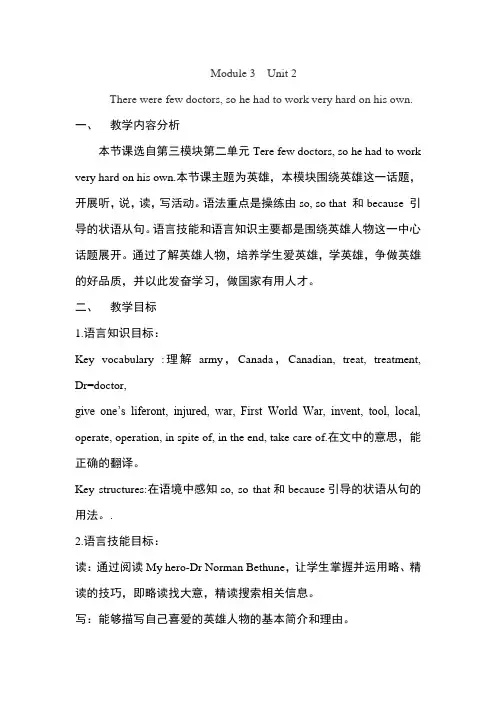
Module 3 Unit 2There were few doctors, so he had to work very hard on his own.一、教学内容分析本节课选自第三模块第二单元Tere few doctors, so he had to work very hard on his own.本节课主题为英雄,本模块围绕英雄这一话题,开展听,说,读,写活动。
语法重点是操练由so, so that 和because 引导的状语从句。
语言技能和语言知识主要都是围绕英雄人物这一中心话题展开。
通过了解英雄人物,培养学生爱英雄,学英雄,争做英雄的好品质,并以此发奋学习,做国家有用人才。
二、教学目标1.语言知识目标:Key vocabulary :理解army,Canada,Canadian, treat, treatment, Dr=doctor,give one’s liferont, injured, war, First World War, invent, tool, local, operate, operation, in spite of, in the end, take care of.在文中的意思,能正确的翻译。
Key structures:在语境中感知so, so that和because引导的状语从句的用法。
.2.语言技能目标:读:通过阅读My hero-Dr Norman Bethune,让学生掌握并运用略、精读的技巧,即略读找大意,精读搜索相关信息。
写:能够描写自己喜爱的英雄人物的基本简介和理由。
3.情感态度目标:通过了解英雄人物,培养学生爱英雄、学英雄、争做英雄的好品质,以此发奋学习,热爱生活,做国家有用人才。
三、学习者特征分析本课学习者的特征分析主要是根据学习基础特点及思维发展情况,加上教师平时对学生的了解而做出的: 1.知识基础:九年级的学生对探究学习与自主合作学习并不陌生,本课的教学重难点为状语从句,在八年级上册第8模块,学生学习过时间状语从句;在九年级上册第二模块,学生学习过时间状语从句,为学习目的、结果、原因状语从句打下了夯实的基础。
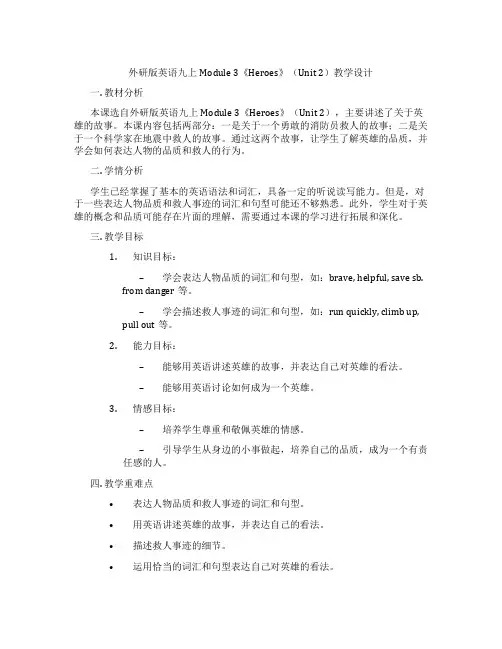
外研版英语九上Module 3《Heroes》(Unit 2)教学设计一. 教材分析本课选自外研版英语九上Module 3《Heroes》(Unit 2),主要讲述了关于英雄的故事。
本课内容包括两部分:一是关于一个勇敢的消防员救人的故事;二是关于一个科学家在地震中救人的故事。
通过这两个故事,让学生了解英雄的品质,并学会如何表达人物的品质和救人的行为。
二. 学情分析学生已经掌握了基本的英语语法和词汇,具备一定的听说读写能力。
但是,对于一些表达人物品质和救人事迹的词汇和句型可能还不够熟悉。
此外,学生对于英雄的概念和品质可能存在片面的理解,需要通过本课的学习进行拓展和深化。
三. 教学目标1.知识目标:–学会表达人物品质的词汇和句型,如:brave, helpful, save sb.from danger等。
–学会描述救人事迹的词汇和句型,如:run quickly, climb up, pull out等。
2.能力目标:–能够用英语讲述英雄的故事,并表达自己对英雄的看法。
–能够用英语讨论如何成为一个英雄。
3.情感目标:–培养学生尊重和敬佩英雄的情感。
–引导学生从身边的小事做起,培养自己的品质,成为一个有责任感的人。
四. 教学重难点•表达人物品质和救人事迹的词汇和句型。
•用英语讲述英雄的故事,并表达自己的看法。
•描述救人事迹的细节。
•运用恰当的词汇和句型表达自己对英雄的看法。
五. 教学方法1.情境教学法:通过设置情境,让学生在实际语境中学习和使用英语。
2.任务型教学法:通过完成任务,引导学生积极参与课堂活动,提高语言运用能力。
3.情感教学法:通过讲述英雄的故事,激发学生的情感,培养学生的品质。
六. 教学准备1.教材:外研版英语九上Module 3《Heroes》(Unit 2)。
2.多媒体设备:电脑、投影仪、音响等。
3.教学课件:根据教学内容制作的课件。
4.教学资源:关于英雄的图片、视频等。
七. 教学过程1.导入(5分钟)利用多媒体展示关于英雄的图片和视频,引导学生谈论英雄的话题,激发学生的兴趣。
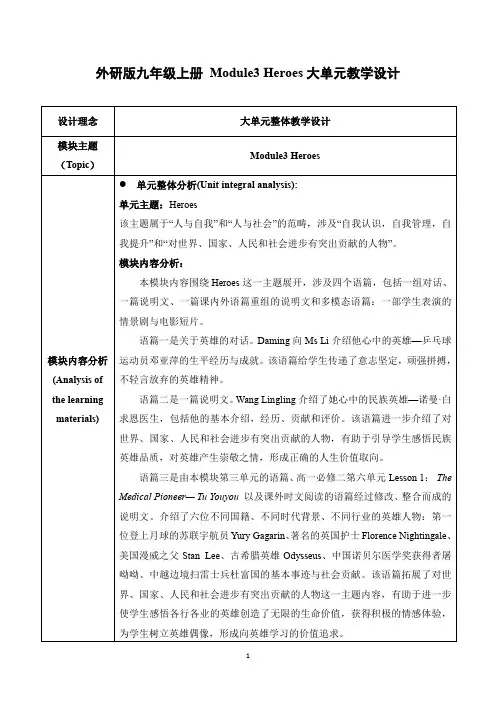
外研版九年级上册Module3 Heroes大单元教学设计模块内容分析(Analysis of the learning materials)语篇四是一部学生自己编剧并表演的情景剧与一段电影短片构成的多模态语篇。
情景剧主要讲述三位无名英雄的感人事迹:地震中为了救学生,自己被压在废墟下的老师、为了救火缺席了自己的婚礼,却丧身火海的消防员、武汉疫情期间,不顾个人安危,过年仍冲锋在一线运送医疗物资的快递小哥;短片Nameless Hero描述了一位普通人日常生活中所做的琐碎却不平凡的“小事”。
该语篇将英雄拉近学生的现实生活,将英雄品质具象到生活中“如何做”:从促进人民和社会进步的小事做起。
本单元的四个语篇从不同视角谈论英雄事迹与品质,单元内各语篇与单元主题之间,以及各语篇之间相互关联,构成三个子主题,即“了解英雄的事迹,用心感悟英雄的人格魅力”,“介绍英雄的故事,用语言描述出英雄的形象”,“学习英雄的品质,用行动呼应新时代的召唤” (见图1)。
每课时围绕单元主题展开,各课之间既相对独立,又相互关联。
学习活动按照学习理解、应用实践和迁移创新三个层次逐步展开,循序渐进,螺旋上升。
学生将零散的知识内容有意义地联系起来,构建基于主题的结构化知识,发展语言运用能力,形成正确的观念和价值追求,实现语言学习和课程育人的有机融合。
核心语言知识分析:本模块主要语法是because、so、so that引导的原因、结果和目的状语从句,学生通过口语操练、句型运用与模块写作等方式感知理本单元学习后,学生能够:模块教学目标&课时安排(Teachingobjectives ofthe wholemodule)模块学习总任务(Module小组合作制作“英雄相册”,排练“英雄剧场”。
task)各课时教学设计(Teaching plan for lessons)第一单元(Unit 1)听说实践(Listening & speaking practice)I.课题(Lesson title) She trained hard, so she became a great player later.II.教材分析(Analysis of the learning material )What: 本语篇选自九年级上册第三模块第一单元的课文,讲述了乒乓球运动员邓亚萍的生平经历与成就。
